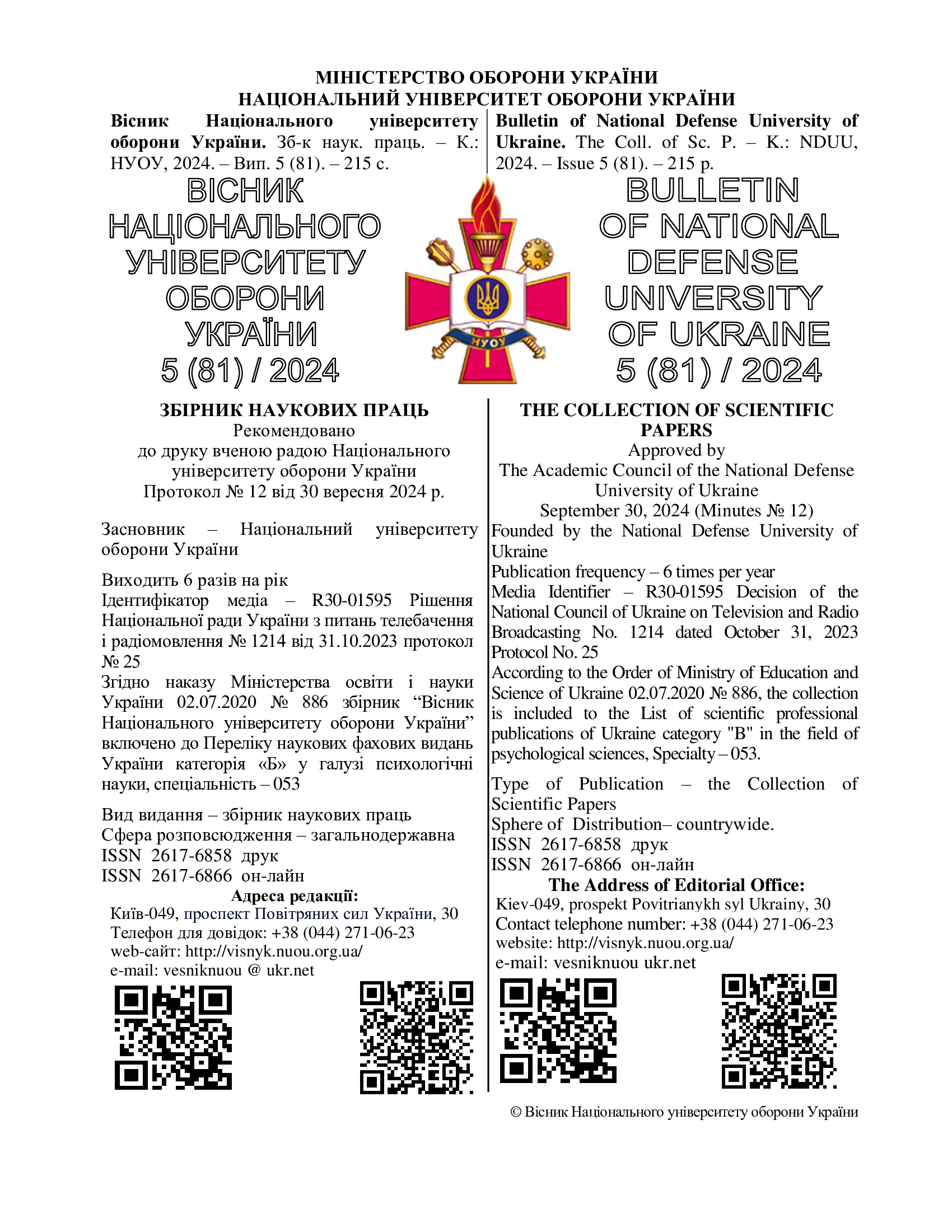САМОРЕГУЛЯЦІЯ ПОВЕДІНКИ ЯК ЧИННИК ФОРМУВАННЯ ФЕНОМЕНУ ІМПОСТОРА
DOI:
https://doi.org/10.33099/2617-6858-2024-81-5-88-95Ключові слова:
феномен імпостора, інтелектуальне шахрайство, перфекціонізм, емоційні стани, саморегуляція поведінки, психологічне благополуччяАнотація
У статті представлено результати емпіричного дослідження, присвяченого вивченню саморегуляції поведінки як чинника формування феномену імпостора. Визначено, що відчуття безпорадності, виснаження, тривоги, перфекціонізм, гнучкість, моделювання та автономність виступають компонентами саморегуляції поведінки, які мають вплив на виникнення феномену імпостора в особистості. Саморегуляція поведінки в такому випадку характеризується браком гнучкості і адаптивності до ситуативних чинників та внутрішніх умов через труднощі моделювання діяльності, яке включає оцінювання ресурсів та умов досягнення поставленої мети.
Завантаження
Посилання
Berezovska L. I., Kostiuchenko Ye. A. (2021). Psykholohiia fenomenu impostora: empirychnyi rakurs. Ukrainskyi psykholohichnyi zhurnal : zbirnyk naukovykh prats, 1 (15), S. 9–23. https://doi.org/10.17721/upj.2021.1(15).1 (in Ukrainian).
Tverdokhvalova, Yu. L. (2020). Samorehuliatsiia povedinky yak komponent pidhotovky maibutnoho fakhivtsia. Osobystist, suspilstvo, zakon: tezy dop. uchasnykiv mizhnar. nauk.-prakt. konf., prysviach. pamiati prof. SP Bocharovoi (m. Kharkiv, 24 kvit. 2020 r.).–Kharkiv, 2020.–S. 100-104. (in Ukrainian).
Aarts, H., Custers, R., & Holland, R. W. (2007). The nonconscious cessation of goal pursuit: When goals and negative affect are coactivated. Journal of Personality and Social Psychology, 92, 165–178. https://doi.org/10.1037/00223514.92.2.165
Baumeister, R. F., Heatherton, T. F., & Tice, D. M. (1994). Losing control: How and why people fail at self-regulation. Academic Press.
Bernard, D. L., Jones, S. C. T., & Volpe, V. V. (2020). Impostor phenomenon and psychological well-being: The moderating roles of john henryism and school racial composition among black college students. Journal of Black Psychology, 46(2–3), 195–227. https://doi.org/10.1177/0095798420924529
Carver, C. S., & Scheier, M. F. (2000). On the structure of behavioral self-regulation. In M. Boekaerts, P. R. Pintrich, & M. Zeidner (Eds.), Handbook of self-regulation (pp. 41–84). Academic Press. https://doi.org/10.1016/B978-012109890-2/50032-9
Clance, P. R., & Imes, S. A. (1978). The imposter phenomenon in high achieving women: Dynamics and therapeutic intervention. Psychotherapy: Theory, Research & Practice, 15(3), 241–247. https://doi.org/10.1037/h0086006
Clance, P. R., & Imes, S. A. (1978). The imposter phenomenon in high achieving women: Dynamics and therapeutic intervention. Psychotherapy: Theory, Research & Practice, 15(3), 241–247. https://doi.org/10.1037/h0086006
Clance, P. R., & O’Toole, M. A. (1987). The Imposter Phenomenon: An internal barrier to empowerment and achievement. Women & Therapy, 6(3), 51–64. https://doi.org/10.1300/j015v06n03_05
Clance, P. R., Dingman, D., Reviere, S. L., & Stober, D. R. (1995). Impostor Phenomenon in an Interpersonal/Social Context. Women & Therapy, 16(4), 79–96. https://doi.org/10.1300/j015v16n04_07
Diskin, E., & Karl, J. A. (2024). Do I Belong Here? Impostor Phenomenon, Well-Being and Purpose at Work: A Mediation Analysis. https://doi.org/10.31234/osf.io/9xzte
Frost, R. O., & Marten, P. A. (1990). Perfectionism and evaluative threat. Cognitive Therapy and Research, 14(6), 559–572. https://doi.org/10.1007/bf01173364
Henning, K., Ey, S., & Shaw, D. (1998). Perfectionism, the impostor phenomenon and psychological adjustment in medical, dental, nursing and pharmacy students. Medical Education, 32(5), 456–464. https://doi.org/10.1046/j.13652923.1998.00234.x
Kumar, S., & Jagacinski, C. M. (2006). Imposters have goals too: The imposter phenomenon and its relationship to achievement goal theory. Personality and Individual Differences, 40(1), 147–157. https://doi.org/10.1016/j.paid.2005.05.014
Vaughn, A. R., Taasoobshirazi, G., & Johnson, M. L. (2020). Impostor phenomenon and motivation: Women in higher education. Studies in Higher Education, 45(4), 780–795. https://doi.org/10.1080/03075079.2019.1568976
Vergauwe, J., Wille, B., Feys, M., De Fruyt, F., & Anseel, F. (2015). Fear of being exposed: The trait-relatedness of the impostor phenomenon and its relevance in the work context. Journal of Business and Psychology, 30(3), 565–581. https://doi.org/10.1007/s10869-014-9382-5
##submission.downloads##
Опубліковано
Як цитувати
Номер
Розділ
Ліцензія
Авторське право (c) 2024 Вісник Національного університету оборони України

Ця робота ліцензується відповідно до Creative Commons Attribution-NonCommercial-ShareAlike 4.0 International License.





